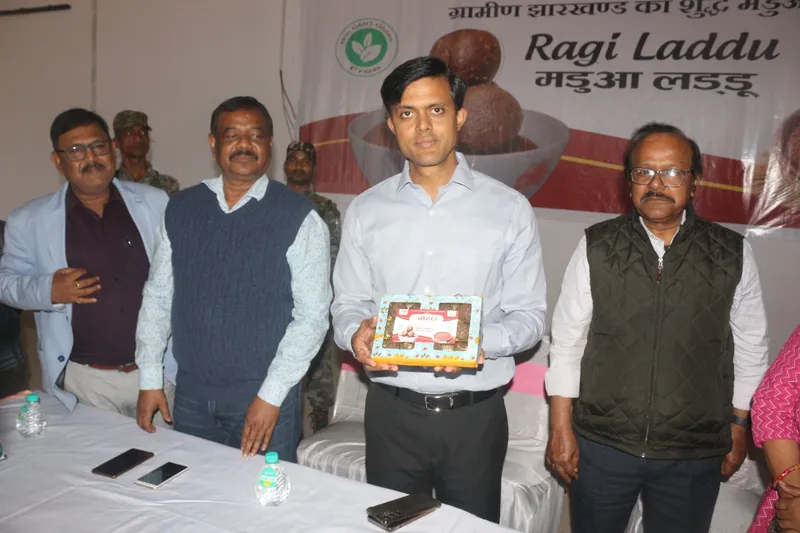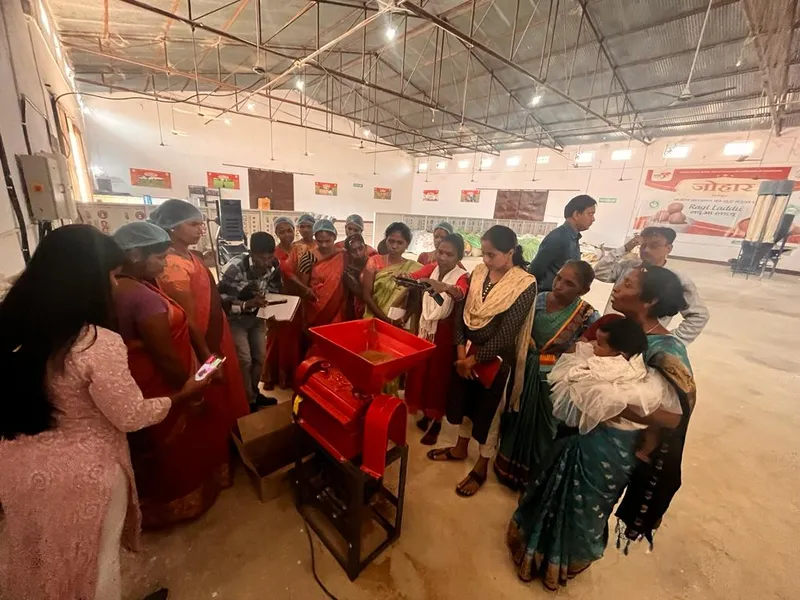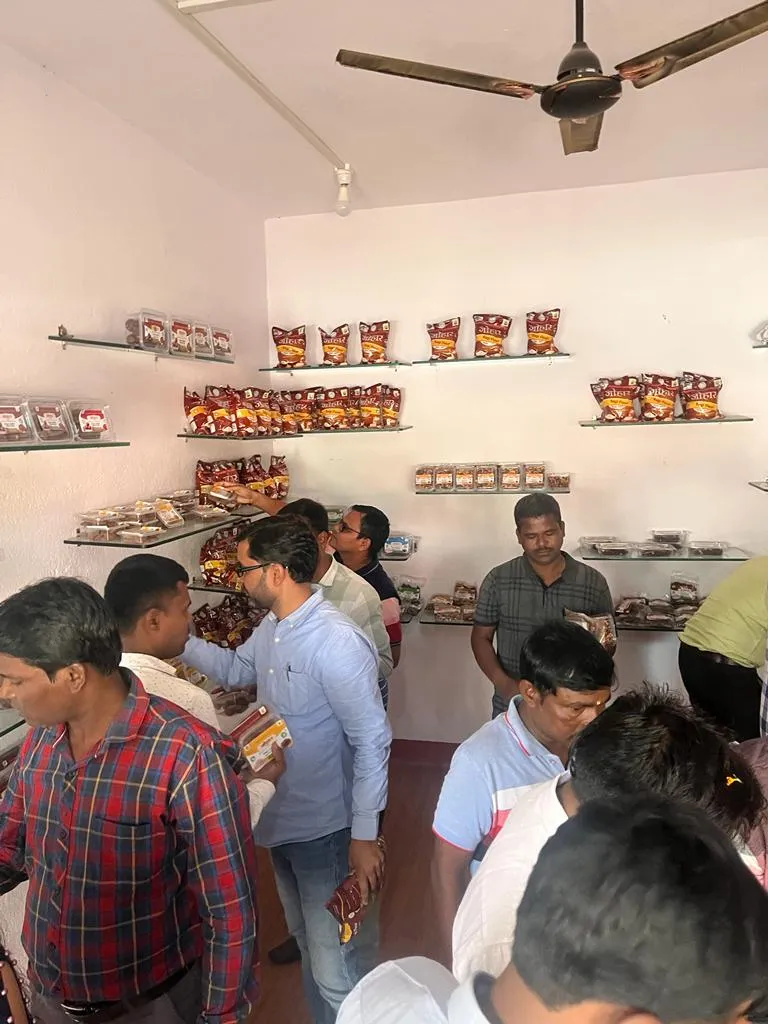Ragi revolution: How an IAS officer is transforming the farming in rural Jharkhand
IAS officer Sushant Gaurav won the Prime Minister’s Award for Excellence in Public Administration for transforming Jharkhand's Gumla district through ragi (finger millet) cultivation.
People living on the undulating terrain of Gumla district in Jharkhand, about 100 km away from Ranchi, largely relied on rain-fed agriculture for sustenance. Farmers in the poverty-stricken area would sell paddy produce at a meagre earning of Rs 16 or Rs 17 per kg.
When Sushant Gaurav was posted in the area as Deputy Commissioner (DC) in February 2022, he realised that paddy cultivation was unsustainable and didn’t suit the place.
“The soil here is acidic in nature and is low on fertility. Additionally, there is a major dependence on rain for a good harvest. Growing only paddy was leading to monocropping,” Gaurav tells SocialStory.
The 2014-batch Indian Administrative Service (IAS) officer wanted to create a more sustainable agricultural system which involved lower risk and better gain. He began convincing farmers to switch to ragi (finger millet), which can withstand dry spells and has high nutritional value. It can also be used to make products to sell in the market.
Beginning with over 5,000 farmers, Gaurav has empowered more than 30,000 farmers in the district to grow ragi. The crop fetches around Rs 30 per kg, leading to a substantial increase in the farmers’ incomes. The officer has also formed a system to help women sell ragi-based products in and out of the state and enable them to earn a livelihood.
“The initiative is not for business or marketing but to improve agricultural practices, foster development, and create better livelihood opportunities,” he adds.
Harbinger of change

IAS Sushant Gaurav (in the centre holding the box)
After completing his BTech studies at Birla Institute of Technology, Mesra, Gaurav initially worked at Reliance. However, the calling for public service led him to leave his corporate position and pursue his aspiration of joining the IAS. He cleared the Civil Services Examination in 2014 and was first posted as Deputy Commissioner in Simdega, Jharkhand.
At Gumla, the government official and his team went to each block to convince farmers to shift to ragi cultivation through clear communication and consistent guidance and support.
The district administration offered free-of-cost seeds to the farmers procured from the Birsa Agricultural University, Ranchi and the National Seeds Corporation. Gaurav’s team also assured the farmers that their harvest would be bought at a good price by the government.
About 5,500 women farmers volunteered to grow ragi.
"Prior to commencing the sowing process, we briefed the farmers on the advantages of cultivating ragi, provided guidance on seed sowing techniques, and assured them of our ongoing assistance throughout the entire process," explains Gaurav.
Later, in the second phase of training, the agriculture department addressed the farmers’ questions and guided them on the use of organic fertilisers and pesticides. This was followed by the final phase of harvesting wherein the farmers were trained in how to spread the husked grains, dry them, and separate the grain from the crop.
As per the district agriculture department, there has been a 217% increase in the net acreage—from 3,500 hectares of ragi cultivation in 2022-23 to 11,100 hectares in 2023-24. This year, the farmers are expecting a production of around 88,700 quintals.
Empowering women
Gaurav explains that once harvesting is over, the farmers sell their harvest to the cluster-level federations which further send the produce to the farmer-produce organisations (FPOs).
The IAS officer has started a women-led FPO, Baghima-Palkot Farmer Producer Company Ltd, which currently has 40 members. The women are tasked with buying ragi from local farmers and further producing varied products like ragi ladoo, cookies, ragi flour, ragi samosa and more.
Bhagwati Devi, a 40-year-old ragi farmer and head of the FPO, recalls that earlier the farmers couldn’t fetch enough income from paddy cultivation, with barely any produce left to take home.
“As a result, we were dependent on market food which added to our expenses,” she explains.
Now, she gets a minimum of Rs 30 per kg for the ragi produce and generates an additional income through the sale of ragi products.
“With the additional income, I feel financially independent which adds to my confidence,” she says.

Women from the FPO at the production unit
The government provided the FPO with 10,000 square feet warehouse free of cost and a grant of Rs 50 lakh to set up a processing unit there.
“We installed a machine which could generate one metric tonne of ragi flour per day,” Gaurav adds. However, selling flour wasn’t enough so the team decided to train the FPO members in running the processing centre to make ragi laddoos, biscuits and other snacks.
The women were also encouraged to participate in a festival at the Gandhi Maidan in the neighbouring Simdega in November 2022. “In one hour, everything was sold out and this gave a lot of confidence to these women,” Gaurav adds.
Later, they also participated in the Millet Conclave in Raipur, Chhattisgarh, where they sold Rs 50,000 worth of laddoos in just one day. The government at the district level has also set up The Johar Millet Cafe in the marketplace of Gumla to sell these products.

The Johar Millet cafe
Devi explains that ragi laddoo, cookies, ragi flour, ragi mixture, ragi thekua, ragi samosa, ragi allochop, and momos are in high demand in the millet cafe run by women FPO. These products are primarily sold at the café and supplied to the company as per the agreement in place.
They are also given to Anganwadi workers, who further distribute nutritious items like ragi laddoos and snacks to households to patients with moderate cases of malnutrition and anaemia.
Gaurav further explains that after the initial funding into the FPO, the women have become financially self-sustainable as they earn money by selling their products and buying the produce straight from the farmers. The government, however, continues to provide free seeds to the farmers.
For his efforts, Gaurav was awarded the Prime Minister’s Award for Excellence in Public Administration in April 2023. This initiative was also presented at the Harvard Business School in 2023.
“I wanted this model to work and sustain in this district. Now it is in the hands of these farmers and women. These women know their capacity and I truly believe they can carry forward the baton,” he signs off.
Edited by Kanishk Singh







